Browse the Library
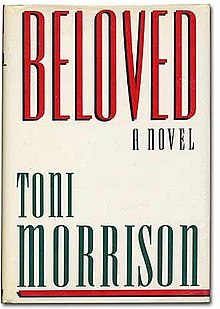 Beloved Toni Morrison Beloved is a 1987 novel by the American writer Toni Morrison. Set after the American Civil War (1861-65), it is inspired by the story of an African-American slave, Margaret Garner, who escaped slavery in Kentucky late January 1856 by fleeing to Ohio, a free state. Morrison had come across the story 'A Visit to the Slave Mother who Killed Her Child' in an 1856 newspaper article published in the American Advocate and reproduced in The Black Book, a miscellaneous compilation of black history and culture that Morrison edited in 1974.
Beloved Toni Morrison Beloved is a 1987 novel by the American writer Toni Morrison. Set after the American Civil War (1861-65), it is inspired by the story of an African-American slave, Margaret Garner, who escaped slavery in Kentucky late January 1856 by fleeing to Ohio, a free state. Morrison had come across the story 'A Visit to the Slave Mother who Killed Her Child' in an 1856 newspaper article published in the American Advocate and reproduced in The Black Book, a miscellaneous compilation of black history and culture that Morrison edited in 1974. 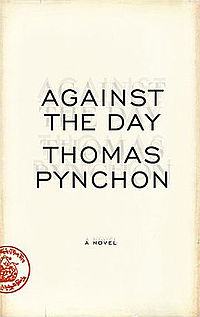 Against the Day Thomas Pynchon The narrative takes place between the 1893 Chicago World's Fair and the time immediately following World War I and features more than a hundred characters spread across the United States, Europe, Mexico, Central Asia, and 'one or two places not strictly speaking on the map at all,' according to the book jacket blurb written by Pynchon. Like its predecessors, Against the Day is an example of historiographic metafiction or metahistorical romance, and at 1,085 pages it is the longest of Pynchon's novels to date.
Against the Day Thomas Pynchon The narrative takes place between the 1893 Chicago World's Fair and the time immediately following World War I and features more than a hundred characters spread across the United States, Europe, Mexico, Central Asia, and 'one or two places not strictly speaking on the map at all,' according to the book jacket blurb written by Pynchon. Like its predecessors, Against the Day is an example of historiographic metafiction or metahistorical romance, and at 1,085 pages it is the longest of Pynchon's novels to date. 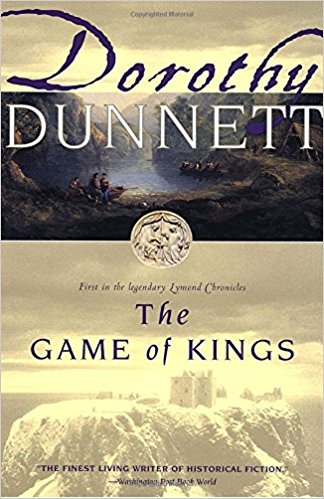 The Game of Kings Dorothy Dunnett Series: Lymond Chronicles number 1Living mostly by his wits and his sword-arm in 16th-century Scotland, Francis Crawford of Lymond is a charismatic figure: polyglot scholar, soldier, musician, master of disguises, nobleman—and accused outlaw. After five years exile, Lymond has recently returned to Scotland, in defiance of Scottish charges against him for treason on behalf of the English and murder. He has assembled a private band of mercenaries and ruffians who follow his ruthless, despotic leadership. The reader only gradually learns that Lymond has returned with a single goal: to prove his innocence and restore his name, he must find the man who framed him and condemned him to two years as a French galley slave before he managed to escape.
The Game of Kings Dorothy Dunnett Series: Lymond Chronicles number 1Living mostly by his wits and his sword-arm in 16th-century Scotland, Francis Crawford of Lymond is a charismatic figure: polyglot scholar, soldier, musician, master of disguises, nobleman—and accused outlaw. After five years exile, Lymond has recently returned to Scotland, in defiance of Scottish charges against him for treason on behalf of the English and murder. He has assembled a private band of mercenaries and ruffians who follow his ruthless, despotic leadership. The reader only gradually learns that Lymond has returned with a single goal: to prove his innocence and restore his name, he must find the man who framed him and condemned him to two years as a French galley slave before he managed to escape. 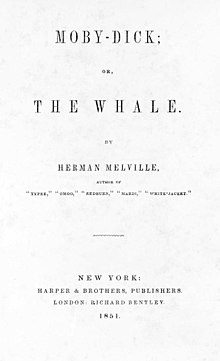 Moby Dick Herman Melville Moby-Dick; or, The Whale is a novel by American writer Herman Melville, published in 1851 during the period of the American Renaissance. Sailor Ishmael tells the story of the obsessive quest of Ahab, captain of the whaler Pequod, for revenge on Moby Dick, the white whale that on the previous whaling voyage bit off Ahab's leg at the knee. The novel was a commercial failure and out of print at the time of the author's death in 1891, but during the 20th century, its reputation as a Great American Novel was established. William Faulkner confessed he wished he had written it himself, and D. H. Lawrence called it 'one of the strangest and most wonderful books in the world', and 'the greatest book of the sea ever written'. 'Call me Ishmael' is among world literature's most famous opening sentences.
Moby Dick Herman Melville Moby-Dick; or, The Whale is a novel by American writer Herman Melville, published in 1851 during the period of the American Renaissance. Sailor Ishmael tells the story of the obsessive quest of Ahab, captain of the whaler Pequod, for revenge on Moby Dick, the white whale that on the previous whaling voyage bit off Ahab's leg at the knee. The novel was a commercial failure and out of print at the time of the author's death in 1891, but during the 20th century, its reputation as a Great American Novel was established. William Faulkner confessed he wished he had written it himself, and D. H. Lawrence called it 'one of the strangest and most wonderful books in the world', and 'the greatest book of the sea ever written'. 'Call me Ishmael' is among world literature's most famous opening sentences. 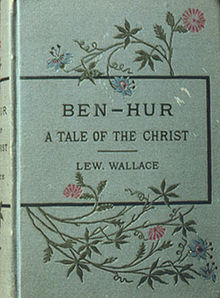 Ben-Hur Lew Wallace Ben-Hur: A Tale of the Christ is a novel by Lew Wallace published by Harper and Brothers on November 12, 1880, and considered 'the most influential Christian book of the nineteenth century'. It became a best-selling American novel, surpassing Harriet Beecher Stowe's Uncle Tom's Cabin (1852) in sales. The book also inspired other novels with biblical settings and was adapted for the stage and motion picture productions. Ben-Hur remained at the top of the US all-time bestseller list until the publication of Margaret Mitchell's Gone with the Wind (1936). The 1959 MGM film adaptation of Ben-Hur was seen by tens of millions and won 11 Academy Awards in 1960, after which the book's sales increased and it surpassed Gone with the Wind. It was blessed by Pope Leo XIII, the first novel ever to receive such praise. The success of the novel and its stage and film adaptations also helped it to become a popular cultural icon that was used to promote numerous commercial products.
Ben-Hur Lew Wallace Ben-Hur: A Tale of the Christ is a novel by Lew Wallace published by Harper and Brothers on November 12, 1880, and considered 'the most influential Christian book of the nineteenth century'. It became a best-selling American novel, surpassing Harriet Beecher Stowe's Uncle Tom's Cabin (1852) in sales. The book also inspired other novels with biblical settings and was adapted for the stage and motion picture productions. Ben-Hur remained at the top of the US all-time bestseller list until the publication of Margaret Mitchell's Gone with the Wind (1936). The 1959 MGM film adaptation of Ben-Hur was seen by tens of millions and won 11 Academy Awards in 1960, after which the book's sales increased and it surpassed Gone with the Wind. It was blessed by Pope Leo XIII, the first novel ever to receive such praise. The success of the novel and its stage and film adaptations also helped it to become a popular cultural icon that was used to promote numerous commercial products. " "
